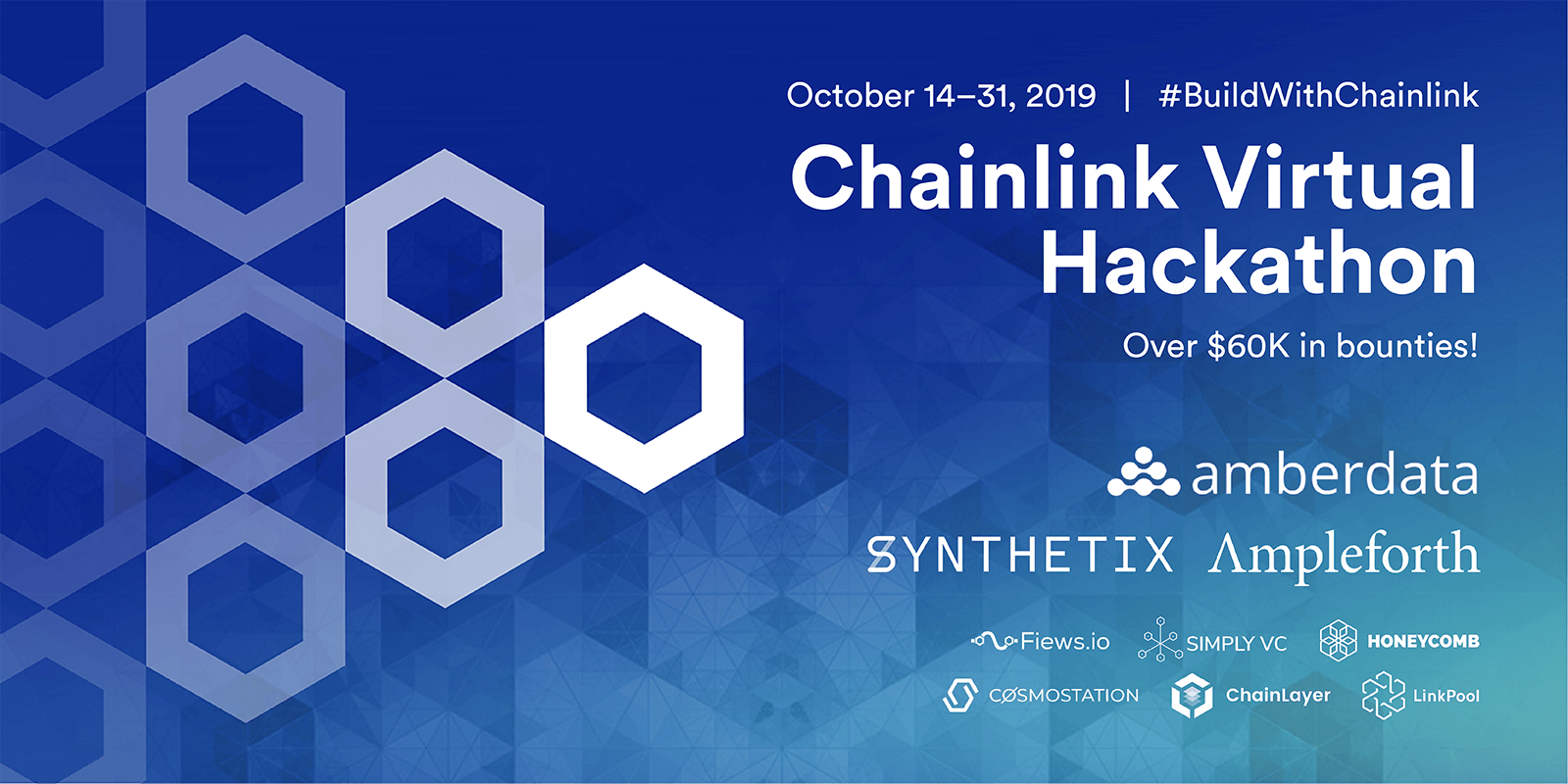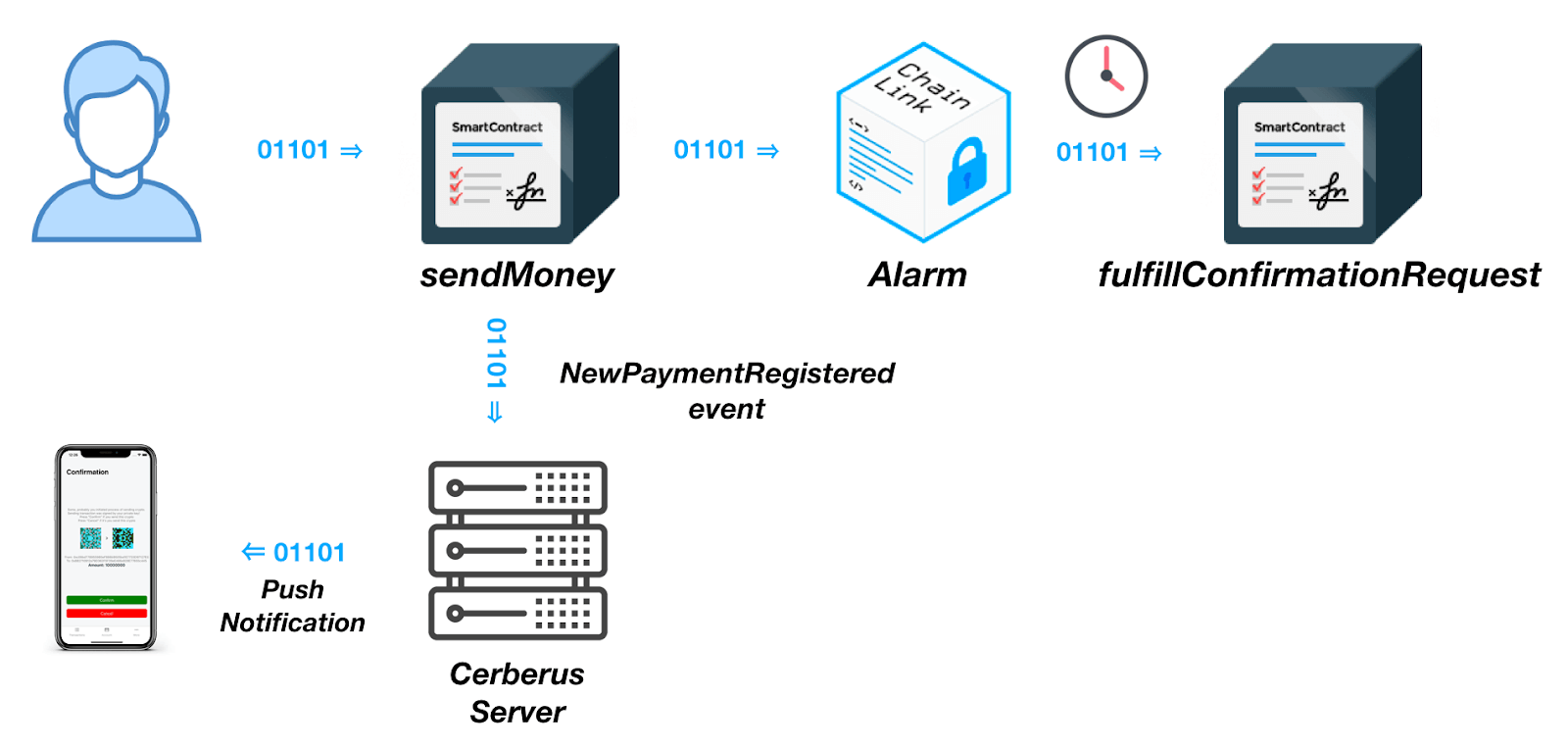Exploring the Wide Variety of Winning Chainlink Applications from Recent Hackathons
It’s been a busy month of building on Chainlink, with the conclusion of three hackathons that featured winning projects with a plethora of new functionalities for decentralized applications thanks to secure and reliable off-chain connections. Not only did we host the very first Chainlink Virtual Hackathon, but we also participated and awarded prizes at the ETHWaterloo Hackathon and the Kyber DeFi Virtual Hackathon. We are impressed by both the range of different applications and the level of real-world business value demonstrated by participants using connected smart contracts.
The Chainlink Virtual Hackathon
This October we hosted the first-ever Chainlink Virtual Hackathon to identify projects with the best real-world applications that leverage external data, events, and/or systems. We awarded bounties to the top three projects, along with six Judge’s Choice awards and a prize for the Most Innovative project. Along with our great group of mentors, we hosted several developer workshops and enjoyed the opportunities to interact with our community of smart contract developers and help them build with Chainlink!

First Place
Earning the coveted first-place honors is LinkPal, a project created by Vitaly Volozhinov. LinkPal is a decentralized escrow application that uses smart contracts to facilitate peer-to-peer (P2P) trades between ETH and PayPal without counterparty risk or third party exchange sign-ups. To ensure trades are trustless, sellers lock up their ETH as collateral in a smart contract which isn’t released until the buyers’ payment invoice on Paypal is confirmed. Once multiple Chainlink oracles verify that the payment invoice has been made to the seller for the correct amount and currency as outlined in the smart contract, the locked-up ETH is released and sent to the buyer via a previously supplied public key. LinkPal is an excellent example of a compelling real-world use case involving existing infrastructure that can be addressed in a secure decentralized manner by aggregating the responses of multiple Chainlink oracles.

Second Place
Taking home the second-place prize is hacker Mikhail Lazarev of Cerebus Wallet. The Cerebus Wallet provides users with an additional layer of security when submitting Ethereum transactions by enabling two-factor authorization via push phone notifications. Every time the users signs a transaction with their private key, they receive a 2FA code to their phone that must be entered to complete the transaction. Through this design, users can prevent malicious hackers from accessing their funds, even if their private key is stolen. Cerebus Wallet uses Chainlink oracles to verify the 2FA code was entered in a specified amount of time using an alarm clock API, as well as to access the Cerebus server to confirm the correct 2FA code was entered.

Third Place
Coming in 3rd place is Flyt, a submission by developer Robin Thomas. Flyt is a decentralized flight insurance application that enables users to obtain flight insurance policies in a trustless and private manner. Instead of trusting the insurance company to set fair rates and settle claims, Flyt uses smart contracts and web data (APIs) retrieved by Chainlink oracles to calculate policy premiums (using a weighted average based on flight and airport ratings) and settle claims automatically within 24 hours (based on flight status).
The Most Innovative Award
Receiving the Most Innovative Award is Total Return Swap, a five-member team from Pier Two, an official node operator in the Chainlink ecosystem. While the staking feature is not finalized nor live on mainnet at the moment, Total Return Swap is a Dapp design that allows Chainlink node operators to hedge the price volatility of the LINK token while it’s staked as collateral during node services. Nodes that want to reduce their exposure to price movements can sell that risk to a counterparty as a synthetic asset tied to the value of the LINK token. Nodes collect interest on the synthetic token loan, while the counterparty obtains leveraged synthetic exposure to LINK.
The Judge’s Choice Awards
Smart Marketing Campaigns uses smart contracts and oracles to automate payments to marketing agencies based on attestations from Chainlink oracles regarding the number of unique visitors to the website. With marketing agencies often at odds with their customers about the ROI of a marketing campaign, specifically due to the difficulty of obtaining accurate data metrics regarding its effectiveness, Smart Marketing Campaigns solves this problem by having Chainlink oracles collect an easily verifiable data metric like new/unique visitors to then use as the basis of a trustless marketing service agreement.
Steam Trader uses Chainlink oracles and the Steam API to implement secure, decentralized payments for in-game assets on the Steam gaming platform. Steam Trader is a fun and relatable project that showcases how Chainlink’s capabilities can be used by anyone to solve the types of problems we all experience everyday, such as trading possessions without counterparty risk.
Contractor is an application that creates fully coded smart contracts based on user-selected features. Those features include choosing the type of smart contract, specific oracles, number of oracles, API connections, aggregation method, and other additional options. Contractor makes it easy for non-technical people to deploy a smart contract with all the features they need for success.

Random World is a platform that hosts open-source and provably fair gambling applications, such as heads or tails and flipping dice, that are built using smart contracts and a random number generator. Incorporating Chainlink’s external adapter for Random.org, RandomWorld games have access to external, tamperproof randomness to use as the basis for their odds, as opposed to relying on internally produced odds that are closed source.
Fiat Gateway makes buying and selling between crypto and fiat currencies much easier by using smart contracts on the backend for escrow, as well as confirming trades via secure, decentralized Chainlink oracles. “Makers” provide fiat and/or crypto liquidity to “Takers” (buyers/sellers) for a makers fee, with all trades being dependent on oracles that confirm successful fiat payments between parties on network like WePay and PayPal.
The Anti-Social Challenge incentivizes users to take breaks from social media through a skin-in-the-game approach to usage. To participate, users lockup collateral in a smart contract, which they can only recover if they stay off social media for a specified amount of time. If they produce any social media activity, which is tracked and reported to the smart contract by Chainlink oracles, they lose their collateral and it’s distributed equally to participants that resisted temptation throughout the entirety of the challenge.
ETH Waterloo
From November 8th – 10th, we attended the ETHWaterloo event in Canada where Developer Advocate Dan Forbes hosted a Chainlink Developer Workshop about building real-world applications using off-chain resources. We also participated in the hackathon by awarding three prizes to participants with the best working Chainlink-enabled smart contracts.
First Place
DeFi-dy, a four-person team consisting of Jean-Baptiste Terrazzoni, Kendrick Tan, Sneh Koul, and Madhur Kumar Sharma, took home the top honors. Instead of limiting investor/trading speculation to token price movement, DeFi-dy allows users to speculate on a company’s performance. To enable this, DeFi-dy issues synthetic assets that are valued based on the fundamentals of a specific protocol. The fundamental value of the protocol, which in the case of their demo is Compound, is calculated based on a weighted algorithm that takes into account metrics such as popularity, usage, collateralization ratio, borrowing power, supply power, etc. Chainlink oracles retrieve these data metrics off-chain and feed them into the smart contract to compute the price of the synthetic asset.
Second Place
CarbonGuilt, a four-person team made up of Jeremías Díaz, Vijay Kandy, Victor Vicente, and Bilal Alghazi, received the 2nd place prize. With proof-of-work blockchains like Ethereum having environmentally intensive consensus algorithms, CarbonGuilt gives Ethereum users the option to offset their carbon footprint. CarbonGuilt uses Chainlink oracles to gather data from an assortment of energy consumption and carbon emission sources and relay it on-chain. Once on-chain, the smart contract uses that data to compute a carbon consumption footprint, which users can opt to pay as a donation to trusted organizations fighting towards reducing the world’s carbon footprint.
Third Place
WeatherBet, a three-person team of Christina Chen, Christian Agnew, and Jake Munsterberg, won the third place bounty. WeatherBet allows users to make bets using ETH on what the weather will be like on a certain day in a specific location in the future. Chainlink oracles are used to gather accurate weather data from trusted APIs and aggregate them together to determine the outcomes of bets.

Kyber DeFi Virtual Hackathon
From September 9th – October 28th, we participated as a Tech Partner in the Kyber DeFi Virtual Hackathon, awarding one prize to the best working Dapp that leverages both Chainlink and Kyber.
Chainlink x Kyber Prize
EthOptions, a four-person team of Parinaa Anand, Nikhil Yadav, Siddharth Bhalla, and Mohsin Hussain, received the Chainlink bounty. Options are a critical part of the financial system. They enable users the ability to hedge the price action of an asset by purchasing an options contract, for a premium, that allows them to buy that specific asset at a specified price in the future. EthOptions is a decentralized options trading platform where users from all over the world can buy and sell options contracts, as opposed to limiting participation to sophisticated parties. Chainlink oracles are used to connect the options contracts with reliable market prices via our CoinMarketCap external adapter. These prices are used to determine payouts upon the option being exercised within the allotted time frame specified in the contract.
Continually Expanding
We’re thrilled to enable so many unique smart contract designs via connection to off-chain resources. It’s only the start of what’s possible too, as more data providers, node operators, project integrations, and external systems become integrated into to the Chainlink network and available for smart contract consumption. We look forward to continued participation in a variety of hackathons as a way of fostering more developer engagement and continuing to expand the Chainlink ecosystem.
